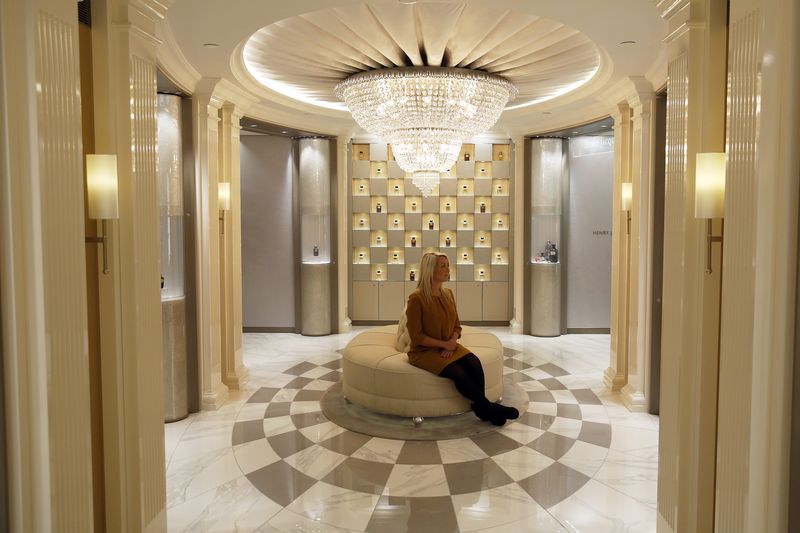By Astrid Wendlandt
PARIS (Reuters) - The first thing one sees on entering Guerlain's perfume shop in Paris' Champs Elysees is the French brand's exclusive collection - Les Parisiennes - which costs 200 euros (159.06 pounds) a bottle and is sold only in a few dozen shops around the world.
Les Parisiennes and other limited editions are Guerlain's answer to the myriad small, niche perfume brands invading the $26-billion fragrance industry and starting to steal market share from big labels.
Niche brands take up increasingly more shelf space at upmarket department stores such as Harrods in London, Printemps in Paris and Bergdorf Goodman in New York.
They are also backed by a new generation of trendy perfume and cosmetics stores such as Liquides and Nose in Paris, Min in New York and Space.NK in London.
They are popular in part because of a growing perception that many mainstream perfumes, designed to mimic other successful scents, end up smelling the same.
"They smell of fear. The fear of being a flop," Denyse Beaulieu, perfume blogger and author of "The Perfume Lover: A Personal History of Scent", says of many mainstream perfumes.
Industry analysts say many mainstream labels such as Yves Saint Laurent, Armani and Lancome have been launching too many so-called "flankers" or variations of the same perfume name, adding to confusion among consumers and overcrowding the market. Also, consumers have become more demanding and knowledgeable.
"I am a big fan of niche brands because they offer something different," says Federico Bardarzzi, 56, a dermatologist from Bologna, Italy, shopping at niche perfume shop Jovoy in Paris.
Niche brands differ from their bigger rivals in that they focus more on the originality of the scent than the packaging and the image projected via a celebrity. They also usually use higher concentrations of perfume extracts and more natural ingredients which tend to last longer.
Even though there are no official statistics on niche scents, analysts estimate they may already represent as much as 10 percent of total high-end fragrance annual sales, because they cost so much more than mass market perfume products.
For department stores such as Harrods, niche perfumes make up the bulk of revenue. But in the category they also include limited editions by major brands such as Chanel, Guerlain, Dior and Hermes, which Harrods head of beauty Mia Collins says sell "supremely well."
Chanel and Hermes give their noses "carte blanche" to create exclusives and try out new ingredients. These perfumes, sold in a limited number of stores, are more a way to regain the exclusive image these brands lost by being too widely distributed than to make money, industry insiders say.
"Exclusives help put some of the dream back into the bottle and they are also a way to seduce retailers which are very much in demand of that kind of product," says Thierry Wasser, Guerlain's in-house "nose".
Wasser created for Harrods a perfume with floral and amber notes called "Royal Extrait" costing 280 pounds a bottle.
Michael Edwards, author of the "Fragrances of the World" guide, currently tracks 360 niche perfume brands compared to under 100 less than a decade ago. His guide counts 1,642 perfume brands overall.
"I think it is currently accepted wisdom in the industry that niche brands are stealing market share from some of the big brands and that trend looks likely to continue," said Exane BNP Paribas analyst Jeff Stent.
DEMAND FOR NICHE
Already, competition from niche brands and the launch of exclusives has hit big names such as L'Oreal's Ralph Lauren and Coty's Calvin Klein. Research firm Euromonitor found they both lost market share in North America and Western Europe.
"The growing movement by key fragrance houses towards more exclusive collections does indicate that there is demand for niche, alternative scents even if they sell at high price points," said Nicholas Micallef from Euromonitor.
Perfume sales at Coty - which heavily relies on celebrity branding - have been declining for more than a year now while perfume sales in general in North America and Western Europe have been flattish to declining in the past two years.
Some of the more recent niche brands include Roja, who used to work for Guerlain, and Francis Kurkdjian, the "nose" behind Jean-Paul Gaultier's "Le Male." Older names are Diptyque and L'Artisan Parfumeur.
One original example is Italy's Nasomatto which created a perfume series around narcotics. His Hindu Grass smells of marijuana and Black Afgano of hashish. A 30 ml bottle sells for 118 euros.
Estee Lauder Companies which owns Jo Malone - which used to be regarded as niche - just bought Le Labo and Editions de Parfums Frederic Malle and consolidation is set to continue as big groups hunt for what could be the next big perfume brand.
(Reporting by Astrid Wendlandt)
